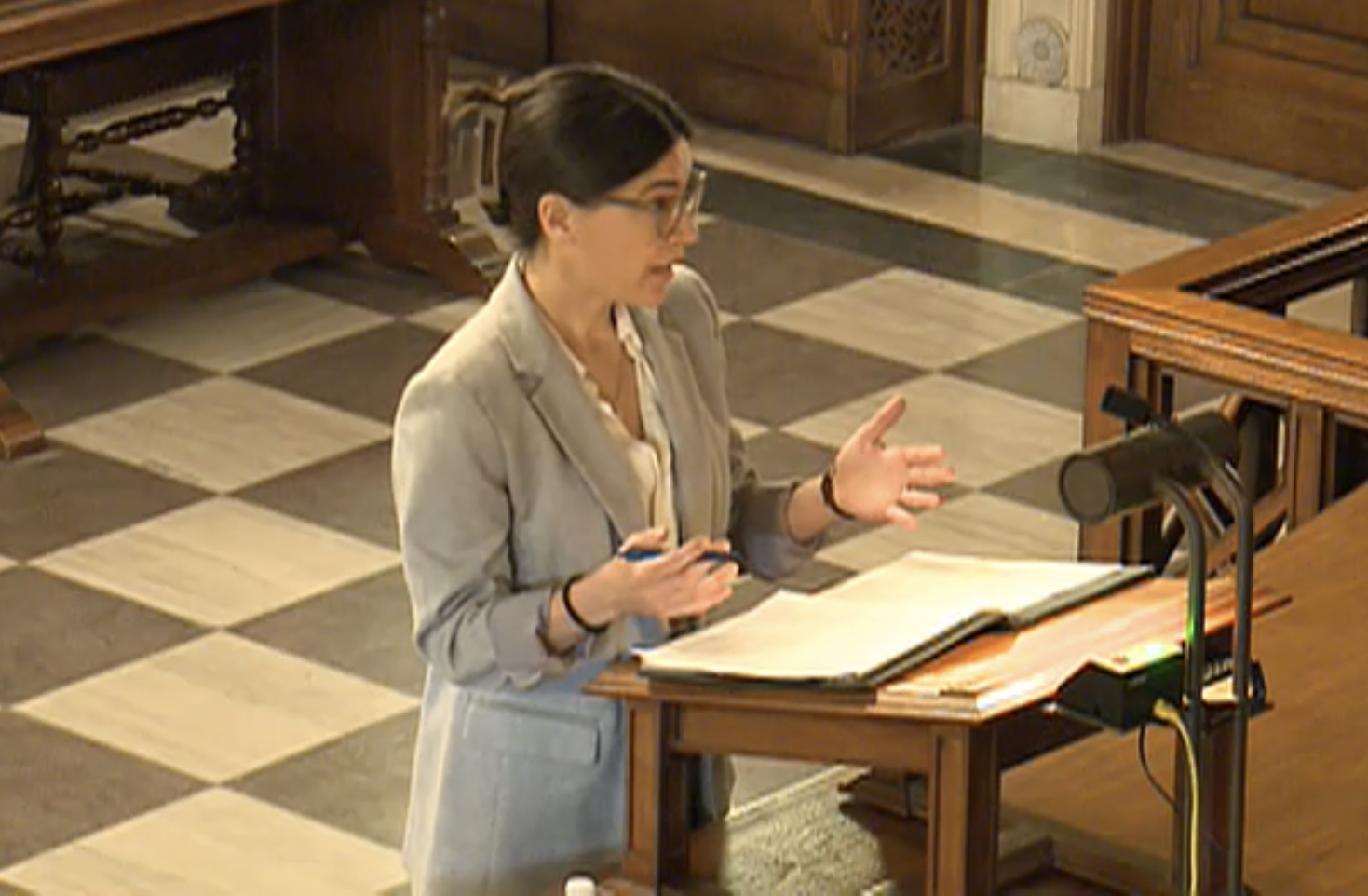Our diverse team of experts assist with all forms of family and humanitarian-based immigration but specialize in the most complex, time consuming and resource-intensive cases.
Their comprehensive knowledge of this area of the law allows them to accept complex cases and a 93% success rate.
It is vital that all individuals pursuing immigration relief have access to high-quality legal services, regardless of ability to pay.

Legal Director Anna Deal argues in front of the Nebraska Surpreme Court in April 2023.
ILC operates the Nebraska Immigration Legal Assistance Hotline (NILAH). Our NILAH paralegal can determine the best referral for your situation. NILAH will gather information about your legal needs and tell you if you are eligible for our services.
Detained foreign nationals facing deportation can apply for free legal representation through our Pro Bono Detainee Project. ILC staff will review the intake form and, if eligible, refer you to a volunteer private attorney who is available to handle the immigration bond and deportation defense free of charge.
NILAH staff are able to determine the best referral for your situation. NILAH will gather information about your legal needs and tell you if you are eligible for our services.
ILC attorneys work with each client to determine the most appropriate and potentially successful immigration relief available.
The most complex cases may take several years to resolve, but there are steps and opportunities along the way that may allow the client to remain in the U.S. and be eligible for employment authorization.
To qualify for asylum, a foreign national must prove that he or she is unwilling to return to the home country because of past persecution or a fear that he or she will be persecuted upon return to the home country. The past or feared future harm must be because of race, religion, nationality, membership in a particular social group, or political opinion. It is also important for asylum-seekers to file their application within the one-year period after the person’s last date of entry into the United States.
DACA is a form of temporary protection from deportation and provides employment authorization for two years for qualifying individuals. Applicants must have entered the United States on or before June 15, 2007, before reaching age 16. They must also be in school or have a high school diploma or general education development (GED) certificate. While the Trump Administration has announced the end of the DACA program, ILC staff can advise and assist current DACA recipients who are eligible for alternative forms of relief.
An individual who has been subjected to battery or extreme cruelty (such as severe emotional abuse) by his or her U.S. citizen or lawful permanent resident spouse, parent, or child, may qualify to file a self-petition under the Violence Against Women Act (VAWA). Such a petition can be filed without the abuser’s knowledge or permission. VAWA provides access to a work permit, protection from deportation, and in many cases, the opportunity to apply for lawful permanent resident status. The provisions of VAWA apply equally to males and females.
A U.S. citizen or Lawful Permanent Resident can file a petition for certain relatives to enable their reunification.
Immigrant populations are especially vulnerable to human trafficking. The T-Visa empowers immigrant survivors to escape their traffickers and achieve self-sufficiency. Persons who were victims of sex or labor trafficking either by coming to or within the United States and who complied with any reasonable request for assistance from law enforcement in the investigation or prosecution of the trafficking, may be eligible for a T-Visa. Applicants may be able to benefit some family members, including spouses, children, parents, and siblings.
A refugee is a person who has fled his or her country because of past persecution or a fear of future persecution because of race, religion, nationality, political opinion, or membership in a particular social group. Refugees are resettled within the United States with the help of local refugee resettlement agencies. Refugees are required to file an application to obtain lawful permanent resident status one year after having entered the United States. ILC staff can assist refugees in that and related matters.
Removal proceeding are formal legal proceedings that occur within U.S. Immigration Courts, involving decisions to deport or grant relief to immigrants within the United States. A U.S. immigration judge oversees these proceedings and determines if the person is deportable, or has a defense against deportation.
Special Immigrant Juvenile status is an option for children in the United States who cannot be reunited with one or both parents because of abuse, abandonment, or neglect. These findings are made by a U.S. state court who must find that it is not in the best interest of the child to be returned to his or her country of nationality. It is important to note that the age of majority in Nebraska is 19 years old and in Iowa, it is 18 years. Well in advance of reaching the age of majority, children and their guardians should seek legal advice on whether this form of relief may apply.
Temporary Protected Status (TPS) is initially granted when the U.S. government determines that conditions in a country (such as armed conflict, an earthquake, or public health crisis) prevent nationals of that country from returning safely to their home. TPS recipients are temporarily protected from deportation during the TPS designation period. The Department of Homeland Security may extend a country’s TPS designation up to 18 months at a time. ILC staff can assist in applying for initial or renewal applications for TPS.
Individuals who were victims of certain qualifying crimes such as domestic violence and sexual assault, who suffered substantial physical or mental harm, and who were helpful to a law enforcement agency in the investigation or prosecution of the crime, may qualify for a U-Visa. Such victims may also be able to include some family members in their application, including spouses, children, parents, and siblings. A U-Visa applicant may request a waiver of past immigration violations, fraud, or crimes, that would otherwise bar relief. The U-Visa is an important tool to foster trust and cooperation between undocumented communities and law enforcement, and put immigrant survivors on the road to independence and healing.
Trained and experienced in immigration law, each ILC attorney works on hundreds of cases every year.
This intense focus prepares them to understand the details of different case types and how even the most complex case can be successfully resolved.
In 2015, a new avenue of relief opened for Nebraska’s abused, abandoned and neglected immigrant children in Nebraska. They now have the ability to continue to live with a non-abusing parent, due to a novel approach by our Child and Family team. Read Thanda and Wunna’s Case.

Stay updated on the latest news, events, and opportunities to support our neighbors. Subscribe to our emails to stay engaged and connected.
©2024 Immigrant Legal Center. All Rights Reserved.